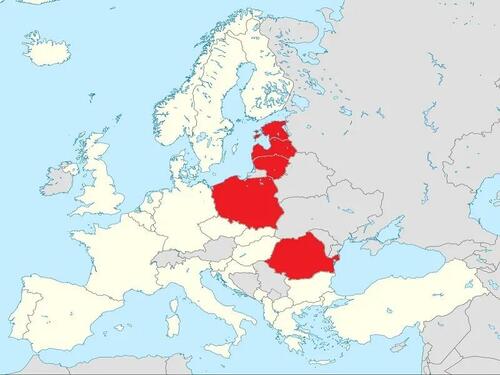Authored by Andrew Korybko via substack,
It’s strongly implied that Poland, the Baltic States, and Romania prefer to remain under the US’ security umbrella...
The Financial Times (FT) cited four unnamed European officials to report that “European military powers work on 5-10 year plan to replace US in Nato”. The UK, France, Germany, and the Nordic nations are named as those that want to present this proposal to the US during the next NATO Summit in June. They also reported that some countries have refused to participate in these talks either out of fear that this could encourage the US to move faster in this regard or due to their belief that it won’t abandon Europe.
FT is likely referring to Poland, the Baltic States, and Romania, the most important countries on NATO’s eastern flank, all of whom prefer to remain under the US’ security umbrella. Poland’s recent flirtation with France could herald a full-blown pivot if the ruling liberal-globalists win May’s presidential election, but for now it functions as an attempt to rebalance ties with the US amidst uncertainty over its future plans. It can also be seen as a misguided negotiation tactic to keep and expand the US’ military presence.
As for the Baltic States, they have a diehard pro-American elite, and they’ll only realign towards the EU in the event that they’re forced to do so by Trump unilaterally curtailing or even totally removing US troops from their territories as part of a grand deal with Russia. Meanwhile, Romania notably rebuffed France’s proposal to extend its nuclear umbrella over the rest of the continent, which can be interpreted as placing more faith in the US than in Europe in the scenario of a crisis with Russia over Moldova.
If these five countries continue perceiving their national interests in these ways, which would require Poland’s ruling liberal-globalists not to pivot to France if they win the presidency (their opponents are comparatively more pro-US), then an intra-NATO European rift would emerge. France and Germany, which are competing amongst themselves and with Poland for leadership of post-conflict Europe, could then find their envisaged influence over Central & Eastern Europe (CEE) challenged by the US.
From Estonia down to Romania and possibly as far as Bulgaria and even Greece, the penultimate of which pivoted to the US long ago against the will of its Russophilic population while the last needs the US to keep Turkiye’s maritime claims as bay, NATO’s eastern flank would fall under US influence. This so-called “cordon sanitaire” could then serve the dual purpose of retaining US influence in this geostrategic part of Europe as it “Pivots (back) to Asia” while also keeping Western Europe and Russia divided.
That scenario could be offset by Poland’s liberals as was explained, but barring that, it’s predicated on: 1) the CEE countries continuing to perceive Russia as a threat; 2) them considering the US to be more reliable of a security partner than the EU; and 3) the US not voluntarily ceding all its influence in Europe. If these variables remain constant, then Western Europe might militarily consolidate largely independently of CEE, which CEE might still appreciate since it’ll bolster their “deterrence” strategies.
After all, if America abandons them in the unlikely scenario of a hot NATO-Russian war that somehow stays below the nuclear threshold, then the CEE countries could rely on a militarily consolidated Western Europe to rush to their rescue if they can’t stop Russia on their own. That said, Russia has no intention to invade NATO, the US’ continued military influence in CEE could deter provocative actions by those anti-Russian countries, and the US’ reputation would be destroyed if it abandoned them during a hot war.
With this insight in mind, Europe might militarily bifurcate into a strategically autonomous western half and an American-aligned eastern one if FT’s report about the first’s plans to replace the US in NATO is true. The only factor that could realistically offset that scenario might be the outcome of Poland’s upcoming presidential election, thus drawing attention to its disproportionate influence in shaping Europe’s future security architecture, the subject of which is at the center of NATO-Russian tensions.
Loading...
